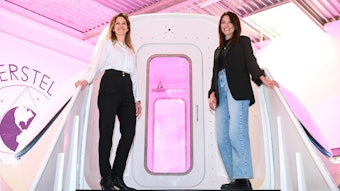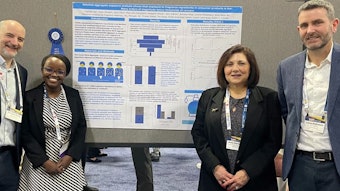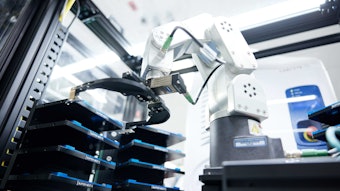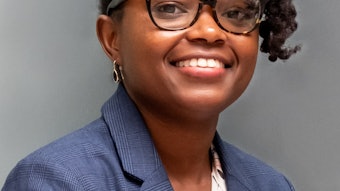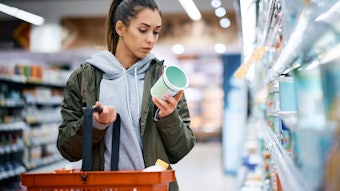
“Sustainability isn’t a mega trend; it’s an über trend,” said Torsten Kulke, kicking off the two-part Fragrance Sustainability Strategies presentation during day one of the 2016 World Perfumery Congress. Über trends change our lives, and they don’t ebb and flow or go out of style.”
“Fragrance companies are already waste-driven users,” Kulke commented. “However, we can look at additional waste streams to produce crude products.”
Kulke, the senior vice president global innovation and regulatory fragrances and oral care scent and care division, Symrise AG, first spoke about what sustainability means to the industry and consumers, and then about how more perfumers and fragrance companies use it.
Green Chemistry
Although fragrance houses are already taking on sustainability, Kulke described opportunities that could be more effectively addressed. For example, he spoke about green chemistry reducing footprint. “Fragrance companies are already waste-driven users,” he commented. “However, we can look at additional waste streams to produce crude products.”
For example, digital consumption has increased usage of packaging, and therefore, cardboard, offers a natural tie to partnering with the paper industry and distilling key ingredients from that source.
Emotional Ties
Despite the relatively low dosage of fragrance in comparison to other consumer goods ingredients, fragrance ties to a brand’s emotional story. It’s that story that could influence consumers’ behavior.
Panel Discussion
Kulke next led an expert panel to debate current and future opportunities in sustainable fragrance development. Joining the discussion were Mike Popplewell of IFF, Jason Kelly of Ginkgo Bioworks and Hervé Fretay of Givaudan.
“How do you define sustainability?” Kulke asked, breaking the ice. Popplewell responded, “First of all, I want to say how happy I am to see sustainability as a topic here at WPC. It’s a new reality and it’s here to stay. It’s in our businesses and we have to adapt. It’s bigger than just a trend. It’s here to stay.”
Kelly added, “We’re starting to see consumers wanting to know how what they consume is made, and they are increasingly aware of the processes. Sustainability extends beyond [products or a business model], it falls under a larger consumer awareness.”
Fretay continued, “It’s social and environmental but also a broader dimension of activity. It’s part of all that we do, and we see it with our clients. [I might add that] it’s important for everybody to be driving in the same direction.”
Who’s Driving Whom?
Connecting this thought, Kulke dug deeper: “So are we [as an industry] driving this change, or are we driven by this change?”
Fretay responded, “Both. It’s true that consumers come from their own angle, and we come from a supplier angle. We come together from two sides, between customers and suppliers, to connect, talk and, together, build and grow sustainability.”
Kelly added, “And there’s an opportunity to employ new technologies that are now available; but we have to educate about [them to explain] what is possible.”
Credibility and Emotion by Design
Kulke (apologetically, to perfumers) turned the conversation toward culturing and fermenting food crops, to which Kelly described in brief how it is possible to create food in new, more sophisticated ways. Popplewell followed with a what-if scenario of fragrance being built in such a way as to communicate a sense of well-being and credibility.
“We all know what an impact fragrance has on purchase intent and acceptability,” said Popplewell. “And why is this? Because fragrance has an emotional impact. So what if fragrance could play a bigger role, expressing credibility and sustainability, and this could be driven into new products?”
Kulke pressed, “So what would be some examples of tying product formulations to emotion?”
Popplewell answered, “Emotion and sustainability can be integrated into a product to perform a function—and there’s a real opportunity in this emotional state.”
Fretay expanded, “[Another example might be] hygiene in emerging markets, which could [be used to] accelerate sustainability and acceptability for wellness. Fragrances can signal to consumers to clean or wash their hands, for example. We can be ahead of the game use fragrance to play a role.” Kelly added, “Fragrance [also] can be used to interpret products as having ‘wellness’ qualities.”
"...Fragrance has an emotional impact. So what if fragrance could play a bigger role, expressing credibility and sustainability, and this could be driven into new products?
Expanding the perspective on wellness, Kelly continued with an explanation of how it’s possible to revive fragrance from endangered flowers. “We’ve sampled flowers going extinct and looked at their genetic sequence. We can then re-create this sequence—so it’s creativity leading to sustainability.”
Pushing Circular Thinking
Kulke steered the panelists in a new direction; “So, where do we need to act? What should we be pushing?”
Popplewell responded, “We need to think less linearly and move more to a circular system, where all aspects are working together. It’s more holistic and a more sustainable picture, over time.”
Kulke continued, “And how can the fragrance industry [do this]?”
Kelly replied, “The ecosystem has been inspirational to me. The materials that [fragrance manufacturers] create should degrade and play well with everything else.”
Fretay went on, “It’s also about being more efficient at each step with naturals. Efficiency and economy serve as inspiration.”
Create and Communicate
Kulke then drove the discussion home. “So where do you see the biggest opportunities?”
Popplewell answered, “Communication. We can do fantastic and authentic work but we need to communicate it to consumers. We also need to learn how to trust proxies to get the word out, to trust they can spread the message.” Additionally, Fretay stressed three t’s: transparency, truth and trust, in our consumers.
Kulke pressed, “So how do we change consumer behavior? And how can our communication link to this behavior?”
"We can do fantastic and authentic work but we need to communicate it to consumers," said Fretay.
Fretay corrected, “If we connect with consumers, our industry can change by listening to them. The consumer has a strong feeling about sustainability.”
Popplewell agreed. “Products are the key. We need clarity in a variety of systems as there is potential for mistrust. We must trust our partners and proxies and lead by example.
Sustainability, GMOS and Insects from the Floor
Kulke then opened the discussion to the audience. Martina Recchiuti, incoming president of IFRA Italia, agreed with earlier comments. “Sustainability is here to stay but there are more than 100 definitions of it out there, and only one definition for ‘sustainable development.’ [I think we] need to stand up as an industry sector and define it. We need to communicate from the inside out.”
Kulke agreed, “The industry has an opportunity, especially with [GMO-related] labels; but too many can be confusing.”
Popplewell nodded, “It’s a strategic shift. I think you’ve put your finger on an important concept. We were driven by regulators but now we’re consumer-driven. And if we can’t come together, it will cause confusion.”
Additional questions covered what the consumer’s perspective is in relation to biotechnology and GMOs, as well as what potential insects hold for fragrance development.
Kelly responded regarding biotech. “There’s more communication about GMOs and I believe they should be included on the label, even though they are safe. We need to demonstrate to the consumer what potential they hold, and the onus is on the biotech industry to open up new spaces to use it. For example, take the microbiome, which can cause malodor. Rather than removing it, we could use it to produce desired fragrances. We need stories to explain to people that it can be used to act as a living air freshener, for example.”
As far as insects . . . Kulke patted the industry on its back for always being open to reinventing and recycling.




